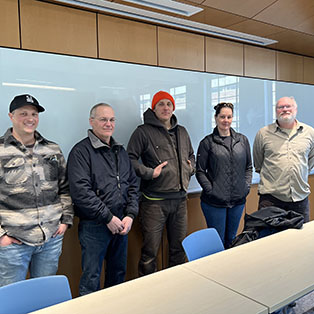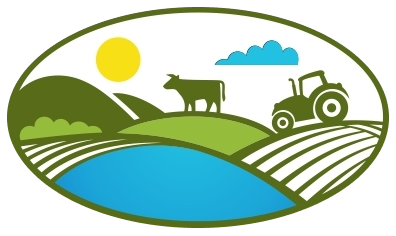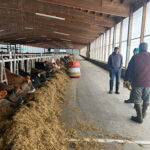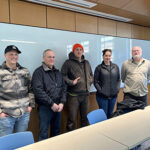
CVFC Water Quality Program Manager Kate Longfield was recently invited by Lindsey Carlson, PhD, a Professor in the Sustainability, Ecology and Policy Department at the University of Vermont to speak to her Water as a Natural Resource students about the intersection of agriculture and water quality in Vermont. Kate’s presentation on March 3rd was enthusiastically received by the students and was followed by a farmer panel, coordinated by Kate and Lindsey, on March 7th. Five CVFC farmer members volunteered to participate in the panel and connect with the students.
Farmer Panelists:
Erik Andrus, Boundbrook Farm, Ferrisburgh
Integrated rice and duck farm inspired by Japan’s Aigamo farming community.
Steve Schubart, Grass Cattle Company, Charlotte
Premium grass-fed & grass-finished beef, pasture raised eggs, and organic pasture
Lorenzo Whitcomb, North Williston Cattle Company, Williston & Essex
Crop farm, (retired dairy farm).
Justin Rich, Burnt Rock Farm, Huntington
Certified organic produce farm.
Cameron Clark, Riverhill Farms, Williston
Certified organic dairy farm, crop farm, certified organic maple sugaring operation, equine boarding, and trail riding.
Panel topics ranged from on-farm water management and conservation practices to current water quality regulations in Vermont.
The farmers are used to dealing with normal spring flooding – it’s part of the annual cycle, but recent summer flooding was a new concern. Steve pointed to interrupted grazing, and Cameron echoed, noting that she had to mow down her crop and buy winter feed after the July 2023 floods. Lorenzo discussed problems with all the silt and dust left by receding waters from the Winooski River. Justin talked about lost crops and income from flooded fields. In contrast, Erik’s rice farm wasn’t impacted by flooding; in fact his rice paddies actually helped to slow flood waters along Little Otter Creek.
During a discussion on government conservation programs, the farmers expressed that most programs seem aimed at large farms, with a one-size-fits-all approach. As Cameron said, “What’s right for a 1000+ herd isn’t necessarily right for my small farm.” That being said, the farmers had also found success implementing conservation practices on their own, and out-of-pocket. It was clear that best management practices are simply part of what this group of farmers does day-to-day. Examples include rotational grazing, injecting manure, establishing vegetated and forested buffers, using minimal tillage, improving cattle laneways to prevent erosion, and converting annual cropland to perennial forage where possible.
When asked what they would want the students to take away from the conversation, there was an enthusiastic response from the group. Erik talked about how farming sustains him and his family, but also how important it is to have fun and find beauty in the work. Cameron agreed, saying “You have to love what you do. I love my cows, my land, the smell of fresh cut hay. It’s a lifestyle, not just a job. My farm is my life.” Lorenzo encouraged the students to stop and ask farmers questions if they see something they don’t understand or want to know more about. That farmers love to talk about what they do, and that there’s always a reason! Justin agreed that accurate information and good dialogue is key, especially given how quickly misinformation spreads today. As he put it, “Most farmers are actually environmentalists first and farmers second. Agriculture has been responsible for the largest percentage of reduction in water pollution in Vermont. Lake Champlain is cleaner because of what farmers have done.” Steve encouraged the students to consider becoming farmers. “Go work on a farm, even if you have a day job. Contribute, learn. We need transparency in our food supply. Otherwise, it’s all manufactured and industrial.”
The students had a range of questions for the panel and asked about river erosion control for agricultural areas, the role of water quality regulations now vs. ten years ago, avian flu in Vermont, and how the Agency of Agriculture can best support farmers. The conversation continued well after class, and both Lindsey and Kate were thrilled with the student response to this opportunity to connect what they have studied to the real world.




